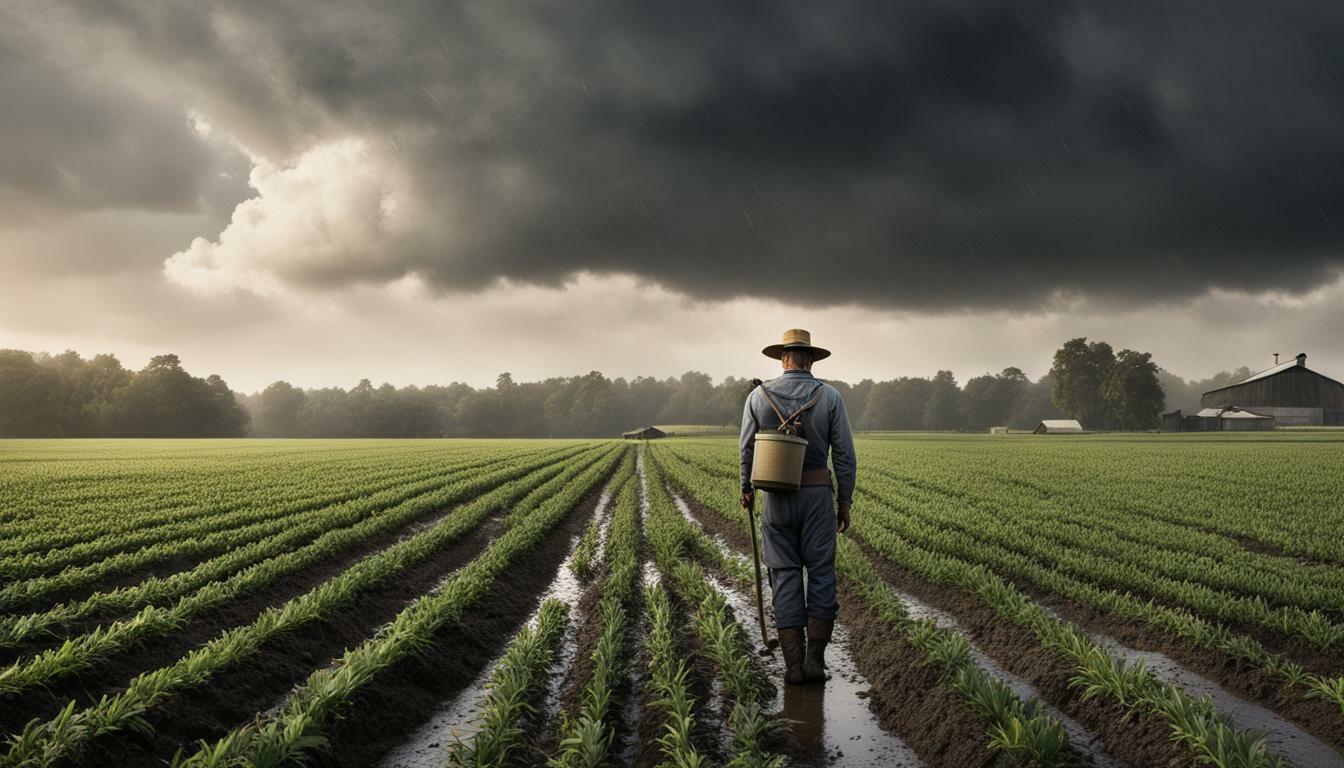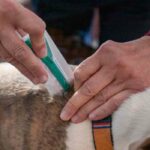
As a professional copywriting journalist, I often get asked about the best practices for spraying pesticides. One common question I receive is whether it is safe and effective to spray pesticides before rain. In this section, we will explore this topic and provide valuable insights on when to spray pesticides for optimal pest control.
Key Takeaways:
- Spraying pesticides before rain can be effective in certain circumstances.
- Timing and weather conditions are crucial factors to consider when spraying pesticides.
- Following best practices and exploring alternative methods can lead to more successful pest control.
The Importance of Proper Timing
Timing is a critical factor when it comes to pest control through the use of pesticides. Proper timing ensures that the pesticides are most effective in controlling pests, while minimizing any potential harm to the environment and non-target organisms.
Timing for spraying pesticides should be based on several factors, such as the type of pest, the growth stage of the plant, and the weather conditions. For example, spraying in the morning when temperatures are cooler and the air is calmer, can help reduce pesticide drift and increase coverage on the plant. This is because during the hotter parts of the day, the heat can cause the pesticide to evaporate before it can reach the targeted pests.
Additionally, timing is essential for reducing the risk of pesticide resistance. Pests can quickly adapt and develop resistance to pesticides if repeatedly exposed to the same chemical. By rotating the type of pesticide used and changing the application timing, growers can reduce the risk of resistance and maintain effective pest control.
The Importance of Proper Timing
To achieve the best results, it is important to consult with a pest control professional or refer to the pesticide label for specific instructions on timing and application rates. Following these guidelines can help to ensure effective pest control while minimizing any potential risks to human health and the environment.
Factors to Consider
When it comes to spraying pesticides, timing and weather conditions play a crucial role in their effectiveness. Before spraying, it is important to consider a few key factors to ensure the best results.
Weather Conditions
Weather conditions are one of the most critical factors to consider when spraying pesticides. Rain, wind, and temperature can all affect the effectiveness and safety of the pesticides. For example, if it is windy, the pesticides may not reach the intended target and may harm beneficial insects instead. Similarly, if it is too hot, the pesticides may evaporate quickly, reducing their effectiveness.
It is generally recommended to avoid spraying pesticides before rain or when rain is expected within 24 hours. Rain can wash away the pesticides, reducing their effectiveness and potentially causing harm to nearby water sources and wildlife. In addition, it is important to avoid spraying pesticides when it is too humid, as moisture can interfere with the pesticide’s ability to stick to plants and insects.
Effectiveness of Pesticides
The effectiveness of pesticides can also be influenced by factors such as the time of day and the stage of the pest’s life cycle. For example, some pests may be more active during certain times of the day, making it more effective to spray during those times. In addition, some pesticides may be more effective when applied at certain stages of the pest’s life cycle, such as during egg laying or larvae stage.
It is important to carefully read the product label and follow the instructions for optimal effectiveness. Using too much pesticide can be harmful to plants and wildlife, while using too little may not effectively control the pest population.
Best Practices for Spraying Pesticides
Now that we understand the importance of timing and weather conditions when spraying pesticides, let’s talk about some best practices to follow for optimal effectiveness.
1. Choose the Right Equipment
Before spraying pesticides, make sure you have the appropriate equipment for the job. This may include a sprayer, protective clothing, and a respirator mask. It’s also important to regularly maintain and clean your equipment to ensure it continues to function properly.
2. Read the Label
Always read the label on your pesticide carefully before using it. This will provide important information on application rates, timing, and any precautions you should take. Failure to follow the label instructions can result in ineffective pest control or even harm to yourself, others, or the environment.
3. Take Precautions
When spraying pesticides, it’s important to take proper precautions to protect yourself and others. This may include wearing long sleeves, pants, and gloves, as well as a respirator mask if necessary. It’s also important to avoid spraying near water sources and to keep children and pets away from the area until the pesticide has dried.
4. Consider Alternatives
In some situations, alternative methods may be more effective or safer than spraying pesticides. These may include using physical barriers, such as netting or traps, or natural pest control methods, such as introducing predator insects or using beneficial plants. Consider your options carefully before choosing to spray pesticides.
By following these best practices, you can help ensure effective pest control while minimizing any potential risks to yourself, others, or the environment.
Alternatives to Spraying Before Rain
While spraying pesticides before rain can be effective in certain situations, there are alternative methods for pest control that may be more suitable.
One option is to use natural pest control methods. This involves using chemical-free methods such as introducing natural predator insects or using organic repellents. These methods can be effective in controlling pests without the use of harmful chemicals.
Another option is to use physical barriers. This includes installing screens or nets around plants or using row covers to protect crops from pests. Physical barriers can be an effective and environmentally friendly way to keep pests at bay.
Cultural practices can also be implemented to prevent pests. This involves maintaining healthy soil and plants, proper crop rotation, and keeping a clean and tidy garden. By creating a healthy and balanced environment, pests may be less likely to take hold.
In addition, using integrated pest management (IPM) techniques can be effective in controlling pests. IPM involves using a combination of methods, such as natural predators, cultural practices, and chemical methods, in a targeted and strategic manner to control pests while minimizing the use of chemicals.
By exploring these alternative methods for pest control, it may be possible to avoid the need for spraying pesticides before rain and reduce the potential harm to the environment and non-targeted species.
Conclusion
In conclusion, spraying pesticides before rain can be an effective method for controlling pests in certain circumstances. However, it is important to carefully consider timing and weather conditions to ensure that the pesticides are used efficiently and safely.
Following best practices, such as choosing the most appropriate pesticide and using protective equipment, can also help to minimize risks associated with spraying pesticides.
Alternatively, there are other methods of pest control that can be employed if spraying pesticides before rain is not a viable option. These may include natural pest predators, traps, or biological controls.
Ultimately, the effectiveness of any pest control strategy will depend on a range of factors, including the type of pest, the environment, and the resources available. By approaching pest control in a thoughtful and strategic manner, it is possible to achieve successful and sustainable outcomes.
FAQ
Q: Can I spray pesticides before rain?
A: It is generally not recommended to spray pesticides directly before rain. Rain can wash away the pesticides, reducing their effectiveness. It is best to wait for a dry period before spraying.
Q: Why is timing important when spraying pesticides?
A: Timing plays a crucial role in pest control. Spraying pesticides at the right time ensures maximum effectiveness in targeting pests and minimizing any potential harm to beneficial organisms.
Q: What factors should I consider before spraying pesticides?
A: Before spraying pesticides, it is important to consider weather conditions, such as wind speed and direction. Additionally, you should assess the specific pests you are targeting and their life cycle stages to determine the most effective timing for spraying.
Q: What are some best practices for spraying pesticides?
A: When spraying pesticides, it is essential to follow label instructions, wear protective clothing, and apply the appropriate dosage. Additionally, choosing the right type of pesticide for the specific pest and using proper application techniques are crucial for effective pest control.
Q: Are there alternatives to spraying pesticides before rain?
A: Yes, there are alternative methods for pest control that can be used when spraying before rain is not feasible. These methods include cultural practices, biological controls, and the use of organic pest control products.
Q: What is the conclusion regarding spraying pesticides before rain?
A: While spraying pesticides before rain can be effective in certain circumstances, it is important to carefully consider timing and weather conditions. Following best practices and exploring alternative methods can lead to more successful pest control.
- Does Flea Treatment Kill Lice? - September 8, 2023
- Does Flea Treatment Kill Mites? - September 8, 2023
- How to Put Flea Treatment on a Dog? - September 8, 2023






